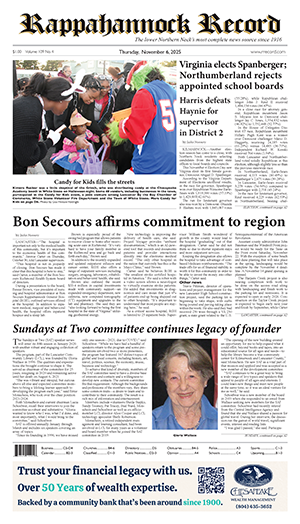Each year in the early 20th century, Harry Dertzbaugh would take the train from Washington to Baltimore, then board a steamboat to Irvington, where he would spend his vacation at a local boarding house.
He had been born in Frederick, Md., in 1876, where he began his career as a barber. In 1904 he moved to Washington to work in the Auditor’s Office of the Federal Court. After a few years there, he transferred over to the Clerk’s Office where he was employed as a deputy clerk until his death in 1978. As a deputy, he served as a courtroom clerk, swearing in witnesses and administering the procedure as directed by the presiding judge. The most famous trial in which he officiated was the lengthy Teapot Dome Case that cast scandal on the Administration of President Warren G. Harding.
Never owning a car, he never learned to drive, thus his vacation had to be by means of public transportation. He lived quite simply for over 50 years in a one-room efficiency apartment in Washington, taking his meals each day in a local “greasy spoon.” His annual vacation was the highlight of his year.
He pre-booked his Irvington trip by mail in those days before long distance telephone service was available. Once in the Northern Neck, he went fishing every day, bringing his catch back to the boarding house for the proprietor to cook and serve to whomever was present. Without means of refrigeration, his catches were to be enjoyed the day they were caught.
Once the vacation was over, he re-boarded the steamboat to return to Washington via Baltimore as he had come to the Northern Neck. For the next 50 weeks of the year, nearly every Saturday when the weather was good, he would take his fishing gear and hike up the towpath along the C. and O. Canal cross over to the Potomac to reach a spot where he hoped the fish would be biting.
On one of those Saturdays, as he was fishing, a hiker burst out of the woods, and said, “Catching anything today?” He turned around, looked up, and matter-of-factly replied, “Not today, Mr. President. They aren’t biting.” The interloper was Theodore Roosevelt who was on one of his escapes from the Secret Service. President Roosevelt replied, “Well, good luck. I hope you get something” and off he went on his jaunt up the river.
The end of the steamboat era also meant the end of his travels to the Northern Neck. He continued to go fishing along the Potomac, but the lore and adventure of the trips to Irvington came to an end.
In the Washington legal community, “Mr. D.,” as he was known, became a legend. Attorneys waited in line for him to file their papers. When he died, in a memorial ceremony, the Federal Court adjourned in his memory.
He was buried in Mount Olivet Cemetery in Frederick, not far from the grave of Francis Scott Key, with federal judges serving among his pallbearers. The Evening Star, Washington’s daily afternoon newspaper, reported that he left an estate of $80,000, which at that time was a small fortune, and especially large for someone who lived simply.
In today’s money, it would be over $800,000. He had been a shrewd investor, one who only bought and never sold his stocks. Much of his wealth came from the appreciation of stocks that he had bought during the Depression when they were low.
The life of Harry Dertzbaugh reflects a part of America that has passed into history. The steamboats that were a great part of his sojourns to the Northern Neck, are no more. No modern president would be able to escape his attendant entourage to hike up the Potomac by himself, and sadly, despite clean-up efforts over recent years, the Potomac remains polluted in the Washington area.
The word, “icon” has become a cliché in our time, but in this case, it seems to be the term that best fits a remarkable life.






